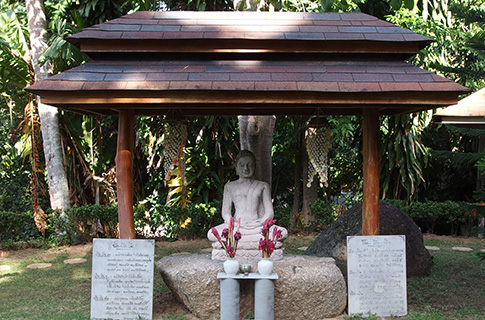Contents:
- Introduction
- Formal meditation
- Daily activities
(Items 3. to 5. available in the provided PDF-file)- Mindfulness
- Food for the mind
- Friends, family members, colleagues
- One activity at a time
- Changes in attitude

Menu
Contents:

Buddha sculpture at Dipabhavan meditation centre, Koh Samui, Thailand
| 1. | Introduction |
| 2. | Formal meditation |
| 2.1 | Time of the day |
| 2.2 | Suitable place |
| 2.3 | Group support |
| 2.4 | Short-term retreats |
The complete text (12 A4 pages) can be downloaded as a pdf-file at:
Meditation in daily life.pdf (319 kB)